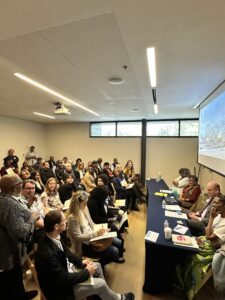Atlanta’s Historic Westside is a beacon of activism, where courageous Black leaders from the late 19th century through the Civil Rights Movement and up to the present day have tirelessly championed change and justice. Despite facing severe adversities, including violence, these leaders have significantly influenced not only the neighborhoods of the Westside but also the broader landscapes of Atlanta and the nation. Their steadfast dedication to building a community where equity and justice are paramount serves as an enduring model for current and future social justice initiatives. This vision of unity and equality is what Dr. Martin Luther King, Jr. referred to as the “Beloved Community.”
At the Westside Future Fund (WFF), we are deeply inspired and instructed by this legacy as we strive for the equitable restoration of these neighborhoods. In my role as President and CEO of WFF, and as a resident of Vine City, I have had the honor of collaborating with community leaders who are pivotal in revitalizing and enriching this cultural legacy. Three I want to note today are Carrie Salvary, Rosario Hernandez, and Annie Moore.
Championed by Carrie, Rosario, and Annie, are four relatively new greenspaces in the community: Kathryn Johnston Memorial Park, Rodney Cook Sr. Park, Mattie Freeland Park, and Lindsay Street Park. These recent additions to Atlanta’s Westside are vital for ongoing development, community engagement, and serve as crucial green infrastructure for stormwater management and environmental sustainability. Complementing these parks, Historic Westside Gardens has developed two community gardens, further enhancing the neighborhood’s commitment to green space and sustainability. These new greenspaces are integral to collective revitalization efforts.
Growing up on Atlanta’s Eastside and later living in Decatur, I took the greenspaces in the community for granted. It wasn’t until I relocated to Vine City, immersing myself in the work of the Westside Future Fund (WFF), that I fully grasped the profound impact of systemic inequity and disinvestment on Black communities in Atlanta’s Westside, including in terms of greenspace accessibility.
I had the honor of being in conversation with these women at the recent 35th annual Parks and Greenspace Conference. The theme of this year’s Park Pride conference, ‘Parks for All: Intention to Action,’ resonated deeply with me. During the event, as I engaged with Carrie, Rosario and Annie, we delved into the significance of their intentional actions in cultivating Dr. King’s vision of the Beloved Community. This was particularly poignant, considering the historic neighborhoods served by WFF were once home to nearly 50,000 residents in the 1950s and 60s. These neighborhoods were a thriving community and were integral in uniting Black residents from diverse backgrounds.
Today, WFF, along with community leaders like Annie, Carrie, and Rosario, is dedicated to reweaving this community tapestry, striving to instill a renewed vibrancy that pays homage to the long lineage of leaders who once called these neighborhoods home. Our strategic focus on land acquisition near greenspaces underscores our commitment to these areas as invaluable community assets. Sitting next to Carrie, Rosario and Annie, I was inspired by our community’s united efforts to elevate these parks as beacons of progress and symbols of hope. These greenspaces stand as testaments to our collective resilience and determination to forge a brighter, more inclusive future for Atlanta’s historic Westside.

